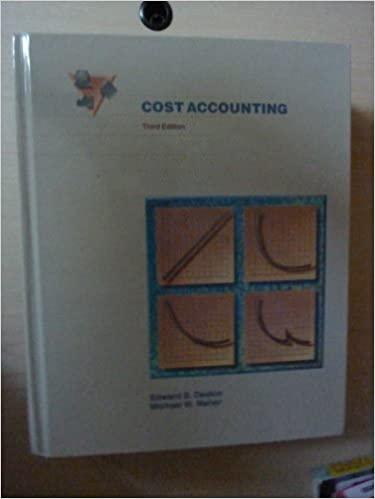Make-or-BuyLiquid Chemical Co.: Liquid Chemical Company manufactures products that require careful packing. The company has a special
Question:
Make-or-BuyLiquid Chemical Co.: Liquid Chemical Company manufactures products that require careful packing. The company has a special patented container lining made from a material known as GHL, and the firm operates a department especially to maintain its containers in good condition and to make new ones as needed. Mr. Walsh, the general manager, believed the firm might save money and get equal service by buying its containers from an outside source. He approached Packages, Inc., and asked for a quotation from it. He also asked Mr. Dyer, his chief accountant for a statement of the cost of operating the container department. Packages, Inc.'s quotation specified it would supply 3.000 new containers for $1,250,000 a year, the contract to run for a guaranteed term of five years and renewable from year to year thereafter. If the required quantity increased, the contract price would be increased proportionally. Additionally, and irrespective of whether the above contract was concluded or not. Packages, Inc.. offered to perform routine maintenance on containers for $375,000 a year, on the same contract terms. Mr. Walsh compared these figures with Mr. Dyer's cost figures for one year's container department operations. Those figures are as follows: 
Walsh concluded that closing the department and entering into the contract offered by Packages, Inc., was optimal. However, he gave the manager of the department, Mr. Duffy, an opportunity to question this conclusion before he acted on it. Even if his department were closed, Duffy's own position was not in jeopardy. There are no net cash consequences for the firm of transferring Duffy to another position. Mr. Duffy thought the matter over. The next morning he spoke to Mr. Walsh and said he thought there were a number of factors to consider before his department was closed. "For instance." he said, "what will you do with the machinery? It cost $1,200,000 four years ago, but you'd be lucky if you got $200,000 for it now, even though it's good for another five years. And then there's the stock of GHL that cost us $1 million. At the rate we're using it now, it'll last us another four years. Dyer's figure of $700,000 for materials includes $200,000 for GHL. We bought it for $5,000 a ton. Today's purchase price is $6,000. But you wouldn't have more than $4,000 a ton left if you sold it because of handling expenses." Walsh called Dyer in and put Duffy's points to him. Dyer said, "I think my figures are pretty conclusive. We're paying $85,000 a year in rent for a warehouse for other corporate purposes. If we closed Duffy's department, we'd have all the warehouse space we need without renting." That's a good point," said Walsh. "Moreover. I don't think we can find room for any of the workers elsewhere in the firm. I'd feel bound to give two of them a pension—$15,000 a year each, say." Duffy added, "What about this $225,000 for general administrative overheads? You surely don't expect to sack anyone in the general office if I'm closed, do you?" "Probably not," said Dyer, "but someone has to pay for these costs. We can't ignore them when we look at an individual department, because if we do that with each department in turn, we shall finish up by convincing ourselves that directors, accountants, typists, stationery, and the like don't have to be paid for. "Well, I think we've thrashed this out pretty fully," said Walsh, "but I've been considering the possibility of perhaps keeping on the maintenance work ourselves. What are your views on that, Duffy?" "I don't know," said Duffy, "but it's worth looking into. We shouldn't need any machinery for that, and I could hand the supervision over to the current supervisor, who earns $50,000 a year. You'd only need about one fifth of the workers, but you could avoid the pension costs. You wouldn't save any space, so I suppose the rent would be the same. I shouldn't think the other expenses would be more than $65,000 a year." "What about materials?" asked Walsh. "We use 10 percent of the total on maintenance," Duffy replied. "Well, I've told Packages, Inc., that I'd let them know my decision within a week," said Walsh. "I'll let you know what I decide to do before I write to them." Assume the company has an after-tax cost of capital of 10 percent per year and uses an income tax rate of 40 percent for decisions like these. Depreciation for book and tax purposes is straight-line over 8 years. The machinery has a tax basis of $600,000. Any gain on the sale of machinery or the loss on GHL sales is taxed at 40 percent. Any GHL needed for Year 5 is purchased in Year 5.
Required:
a. What are the four alternatives implied in the case?
b. What action should be taken? Support your conclusion with a new present value analysis of all the mutually exclusive alternatives (assume a five-year time horizon).
c. What, if any, additional information do you think is necessary for a sound decision? Why?
Step by Step Answer:






